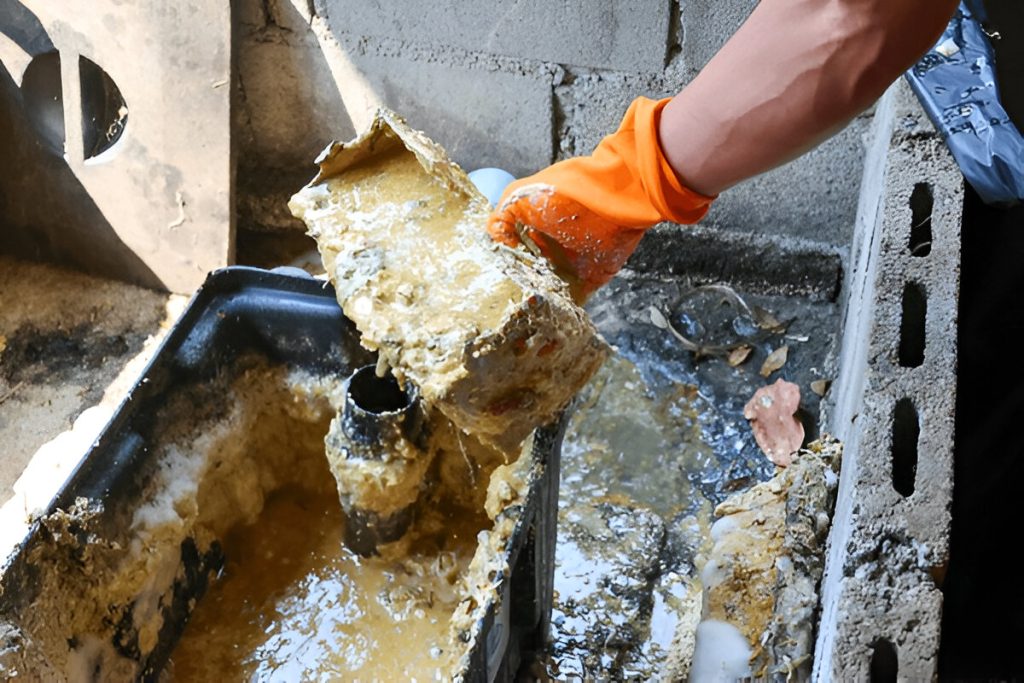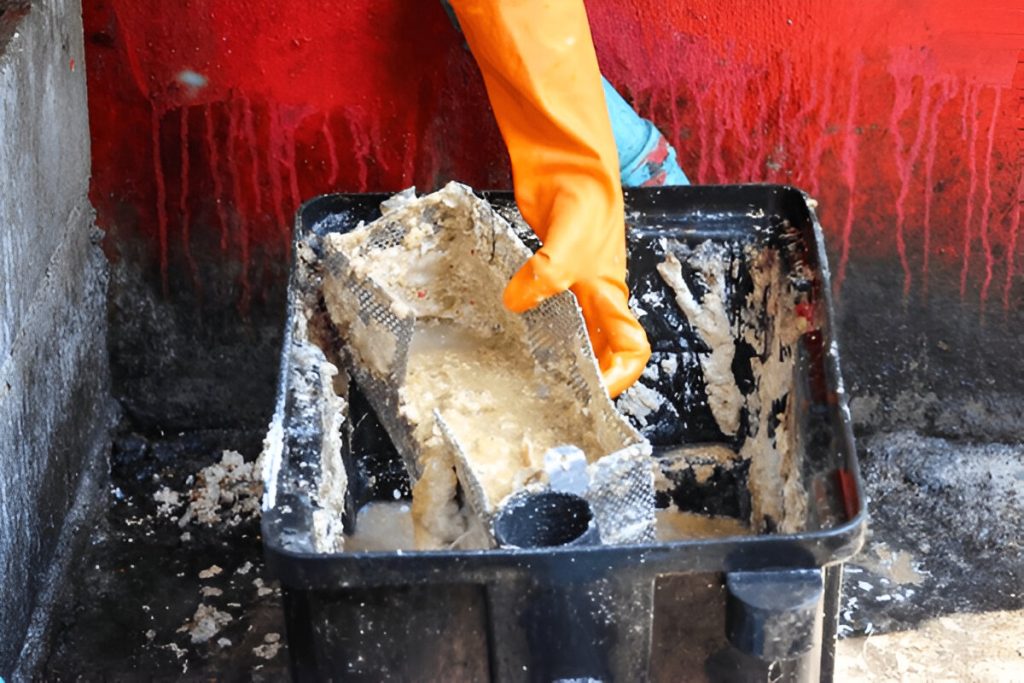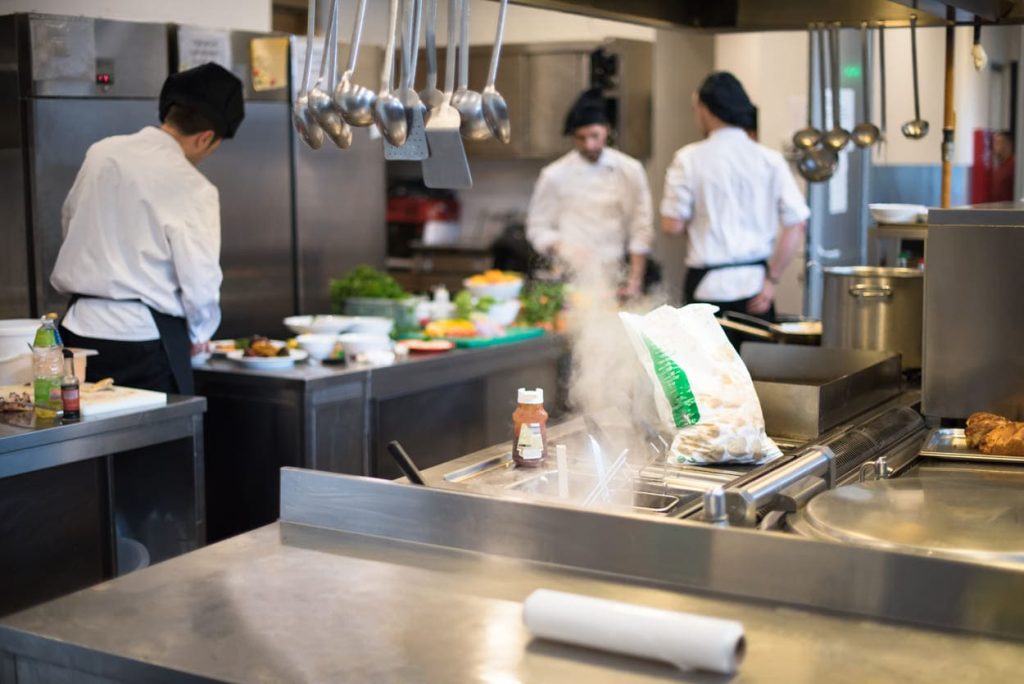Chicago Hood Cleaning
Grease Trap Cleaning in Matteson, IL
Rated 5 stars on Google

Grease Trap Cleaning Solutions for Your Kitchen
A dirty grease trap can lead to serious issues in your kitchen. We help business owners in [location] avoid these grease trap headaches.
Foul Smells in Your Kitchen
A full grease trap can lead to an overwhelming odor. Nasty smells can be caused by your grease trap, and they need to be cleaned.
Clogged Drains
When a grease trap is too full, it can block your pipes. This causes sinks to drain slowly—or worse, flood.
Health Code Violations
Grease trap problems can lead to health code violations. Neglecting grease trap maintenance could shut you down or result in hefty fines.
Grease Overflow
When a trap overflows, it can send grease into your floors or drains. An overflowing grease trap makes your kitchen a hazardous place to work.
Higher Plumbing Costs
Clogs caused by grease buildup are expensive to fix. Fixing that can be costly.
Uncomfortable Work Environment
No one wants to work—or eat—near bad smells and dirty drains. A clean grease trap improves kitchen safety and the overall work atmosphere.
Why Choose Us for Vent Hood Cleaning in Matteson

Experienced Professionals
We’ve been in the business for years, offering expert grease trap cleaning services. Our team is highly trained to handle grease buildup and prevent common kitchen issues, ensuring your kitchen stays clean and operational.

Health Code
Compliant
We ensure your grease traps are up to code. Regular cleaning prevents violations and fines, so you can avoid costly problems and keep your kitchen in top shape for health inspections.

Prompt and Reliable Service
We understand the importance of keeping your kitchen running smoothly. That's why we offer fast, reliable grease trap cleaning services that won’t disrupt your business. We'll work around your schedule to minimize downtime.

Keep Your Kitchen Running Smooth with Grease Trap Cleaning in Matteson
You know that your kitchen is the heart of your business. A hidden kitchen problem is your grease trap. Ignoring grease trap maintenance can lead to big headaches.
Understanding Grease Trap Cleaning
Grease trap cleaning involves removing the buildup of grease and food waste from your kitchen’s grease trap. Grease trap cleaning keeps your kitchen flowing smoothly and meets health codes.
Why Grease Trap Cleaning is So Powerful
Neglecting grease trap cleaning can lead to bigger issues that impact the safety and cleanliness of your kitchen. Regular cleaning helps avoid costly repairs and ensures your kitchen meets health and safety standards.
Grease Trap Cleaning Can Help Solve These Issues in Matteson
When you don’t clean your grease trap, it can lead to several problems:
Foul Kitchen Smells – Full grease traps stink up your kitchen and even the dining area.
Clogged Drains – A clogged grease trap can cause your drains to slow down or back up.
Health Code Violations – Health inspectors will look at your grease trap. A full grease trap may result in expensive fines or business shutdown.
Overflowing Grease Traps – Overflowing grease traps create dangerous messes. It’s messy, difficult to fix, and puts your kitchen at risk.
Plumbing Problems – Grease traps cause plumbing issues when left unchecked. A neglected grease trap can result in costly plumbing repairs.
Unhappy Staff and Customers – A greasy kitchen is unappealing to both staff and customers. Cleaning your grease trap ensures a healthier, safer, and more pleasant work environment.
Let Us Help
Our professional grease trap cleaning service in Matteson helps you avoid these issues and keep your kitchen in top condition. We clean your entire system, ensuring your business is safe, compliant, and ready for anything. Contact us for hassle-free, professional grease trap cleaning!

We Proudly Serve in Matteson
Located in Cook County, Illinois, Matteson is a vibrant city with a rich history dating back to the early 19th century. Originally settled in 1855, Matteson quickly grew as a farming community due to its fertile soil and strategic location near railroad lines. Today, Matteson is a thriving suburban community known for its excellent schools, safe neighborhoods, and diverse population.
Residents of Matteson enjoy a high quality of life with easy access to parks, shopping centers, and recreational facilities. The city boasts several parks and playgrounds, perfect for outdoor activities and family fun. Matteson also offers a variety of dining options, ranging from casual eateries to upscale restaurants.
One of the city’s main attractions is the Matteson Community Center, which hosts a range of programs and events for residents of all ages. The nearby Lincoln Mall is a popular shopping destination, featuring a mix of national retailers and local boutiques.
As a grease trap cleaning contractor servicing the community of Matteson, we are grateful for the support and business of our customers over the years. We look forward to continuing to provide top-notch service to the residents of Matteson for many years to come. Thank you for choosing us for your grease trap cleaning needs.
Frequently Asked Questions
Grease trap cleaning is the process of removing built-up grease, food particles, and waste from your grease trap. This helps keep your kitchen’s plumbing system running smoothly, prevents bad odors, and ensures that your business is up to code.
The frequency of cleaning depends on the size of your kitchen and how much grease is used. Generally, it’s recommended to clean your grease trap every 1-3 months. Regular cleaning prevents overflow and keeps your kitchen running efficiently.
Regular grease trap cleaning prevents costly plumbing problems, bad odors, and health code violations. It also helps your kitchen stay sanitary and safe for both employees and customers. A clean grease trap ensures your business operates smoothly.
Neglecting grease trap cleaning can lead to foul odors, slow or clogged drains, plumbing backups, and even health code violations. It can also create an unhygienic environment, affecting both staff and customers.
The cleaning process typically takes 1-2 hours, depending on the size and condition of the grease trap. We work efficiently to minimize downtime for your kitchen and ensure everything is cleaned properly.
The cost of cleaning your grease trap varies based on the size and condition of the trap. However, regular cleaning is more affordable than dealing with plumbing repairs, health code violations, or a broken-down kitchen.
While it’s possible to clean your grease trap yourself, it’s best left to professionals. Our team has the experience and equipment to safely and thoroughly clean your grease trap, ensuring it’s done right and meets all local codes.
